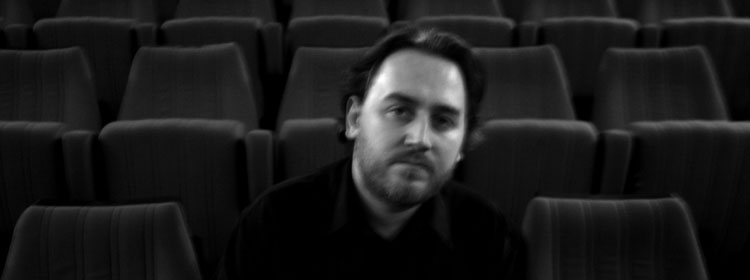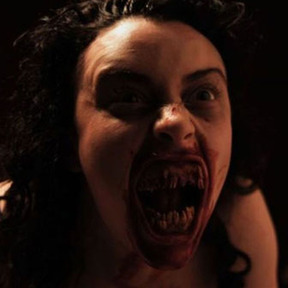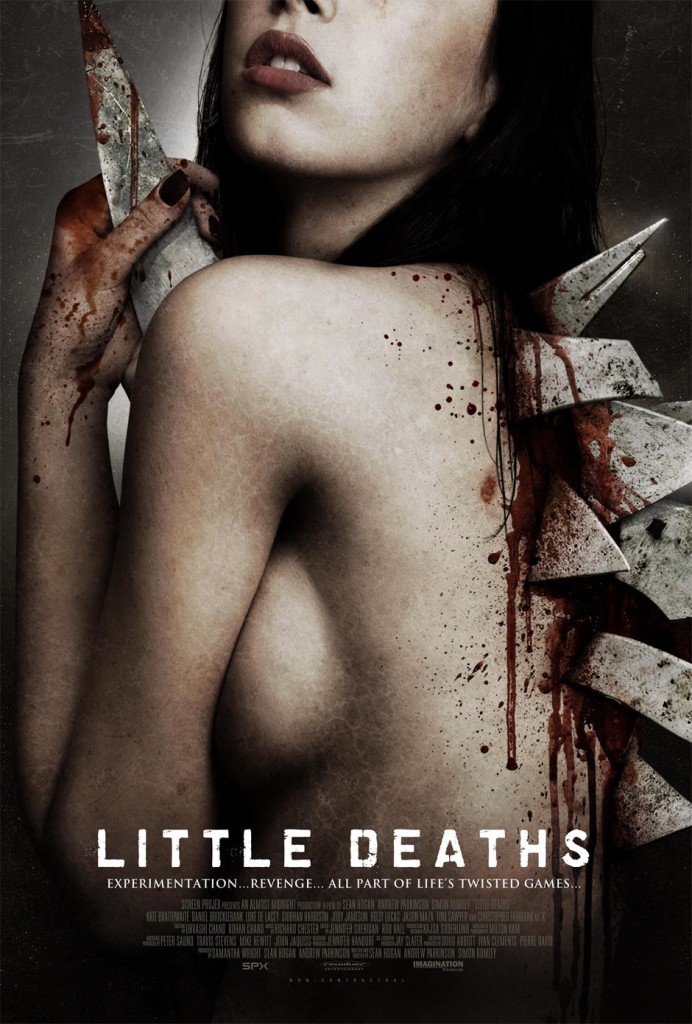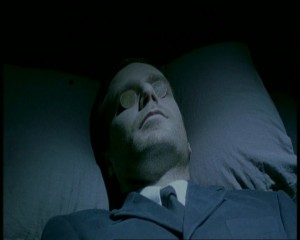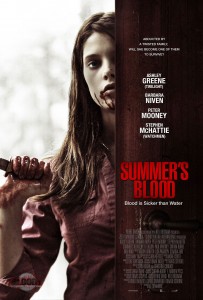“LITTLE DEATHS”: AN INTERVIEW WITH SEAN HOGAN
LITTLE DEATHS: Director Sean Hogan talks about his collaborative horror omnibus and the troubled releases of his British indies
UK-based horror anthology Little Deaths – a collaboration between independent directors Sean Hogan (Lie Still), Simon Rumley (The Living and the Dead, Red White + Blue) and Andrew Parkinson (Venus Drowning) – is the latest in a resurgence of inspired horror anthologies that includes The Theatre Bizarre, Paris I Kill You and the recently-announced ABCs of Death. Exec-produced by Pierre David – whose genre catalogue runs the gamut from Cronenberg’s Videodrome to Lee Demarbre’s Smash Cut – Little Deaths is a fascinating study of emotional manipulation and various forms of addiction, from drug abuse to co-dependency. Artfully blending transgressive ideas and visuals with the low-key realism characteristic of British indies, each segment is a unique aesthetic statement that nonetheless feeds into and off of its cohorts to create an impressively cohesive whole.
Hogan’s biting House and Home opens the film with a bang, focusing on an upper class British couple who pick up street people and take them home in order to humiliate and abuse them. In Andrew Parkinson’s Mutant Tool, Jodie Jameson (the award-winning actress for Parkinson’s earlier Venus Drowning) plays an on/off callgirl recovering from a drug habit, whose boyfriend unwittingly signs her up for experimental treatment with a doctor doing unethical experiments in traumatic bonding. The power games that run through all the romantic relationships in this anthology are most overt in Simon Rumley’s Bitch, in which a put-upon office administrator works out her issues by emotionally abusing her partner through a degrading sexual routine.
Little Deaths is also the latest in a series of films Hogan has found himself battling executives and sales agents over. From the re-titling of his subtle ghost story Lie Still (2005) to the recent controversy surrounding cuts to Little Deaths – which played in uncut form at SXSW earlier this year to rave reviews – Hogan is a writer/director whose career is fraught with marketing misfires that have taught him some valuable lessons about protecting one’s vision. Hogan was kind enough to talk to Spectacular Optical about his experiences making Little Deaths and Lie Still and the numerous exciting projects he has in the works.
——————
What brought the three of you together? What you first started talking about it, what was the unifying theme you were going for? Was there meant to be a thread running through all the stories or was it kind of anything-goes?
I originally met Simon at Austin’s Fantastic Fest in 2006 – we both had films playing there that year. As did Andrew actually, although he didn’t attend – I met him later on back in London. Anyway, a group of us London-based genre filmmakers started socialising regularly – a lot of bitching about producers and the state of our careers! – and we were all on the lookout for that elusive next project. At the time I’d been developing a script for about a year, only for it all to fall apart at the last minute, so I was feeling very frustrated and anxious to get something going. And then it occurred to me that I had all these other filmmakers at my fingertips, and that there hadn’t been a good horror anthology for a while. Stupidly, I also figured that putting together an anthology would be a quicker and easier process – kind of like making 3 shorts, right? Never been so wrong in my life!
So with all that in mind, I approached Andrew and Simon. It seemed to me that whilst we all had very different approaches, tonally I thought we’d be a good fit. They liked the idea and everything started falling into place pretty quickly after that. There was no initial discussion of theme or anything like that – it all happened very organically. We basically just went away and came up with a story we wanted to do, and then when we came back to the table to compare notes, bam – there it was. Each of the stories involved some form of sexual horror, and so instantly we had our unifying link – by pure coincidence! So after that, we just ran with the idea that we would really try and push the sex/horror dynamic.
We did discuss the notion of there being some kind of linking or typical anthology framing device, but decided against it in the end. It just seemed a bit old school, and as much as I love the old anthology horror movies, we wanted to stay away from doing that. Besides, whilst I think the three segments complement each other well, they are all pretty different, and we weren’t sure about trying to set them all in the same world, as it were. So we figured that the thematic links would ultimately be enough to tie the whole thing together.
Can you tell me about your episode?
I was in a really foul mood when I wrote it! Basically, I’d wanted to write something about sexual power games for a while, so that was kind of the initial seed. And it was also a bit of a reaction to my first film, which was much more of a suggestive, Lewton-esque type of movie. So after doing that, I was ready to shift to the other end of the horror spectrum and make something a bit more confrontational. I don’t recall entirely how the story came about, but I think once I had the initial notion of the predatory couple seeking out victims for their perverse pleasures, the whole over/underclass opposition came into focus for me pretty quickly. And with that the idea of the predators then being preyed on, and the whole food/sex motif that runs through the story. Someone mentioned certain similarities to Raw Meat/Death Line, and whilst it wasn’t conscious, I love that movie and there are definitely connections – the heavy emphasis on class dynamics, and the idea of the underclass rising up to devour the ruling elites…
The female character has an ambiguous relationship with the homeless, because she sees them as weak, but also acknowledges that you have to be very strong to live on the streets. She is also is the visibly dominant of the couple, where does her vitriol stem from? How would you describe her relationship with the homeless?
I tend not to worry about providing too much backstory for characters in most cases, as I think it can get pretty reductive. Too many films these days take the position that everything has to be explained. Victoria is a predator, plain and simple. She is the type of person that believes in class privileges, in taking what you want, regardless of how that may affect others. I think those kind of people have always been with us, and sometimes they are even abetted by the political climate of the day – sadly, this is something we’re seeing a lot of right now. Essentially, Victoria would wholeheartedly subscribe to Margaret Thatcher’s doctrine that “there is no such thing as society”. So if you wanted to look at it that way, she’s definitely a child of the 1980s!
What do you think the husband would be like without his wife? Is his wife an enabler for his sick desires, or do you think he wouldn’t have this life if it weren’t for her?
Well, on the one hand, Richard will do anything for his wife. He is deeply in love with her, but is obviously the submissive in the relationship. The actors and I discussed the fact that Victoria had probably married Richard for reasons of social status, and so beyond that, has very little interest in him; emotionally, sexually, or otherwise. Richard therefore sees their games as a way of getting closer to Victoria – it’s the only thing he can really share with her. So I don’t think this is a path he would have entirely taken on his own; however, the other thing we discussed is that these games have now become an outlet for his repressed rage at Victoria. All of his suppressed resentment and anger and desire have now been given an opportunity to come spilling out, and so in that sense, it has become something he equally wants and needs for himself.
Is the couple’s treatment of the homeless a genre film exaggeration of what you perceive to be society’s treatment of the homeless in general? In the spectrum of homeless to upper class, where would you place yourself in this “food-chain”? What do you do when someone asks you for change?
It’s obviously taken to an extreme; I don’t know whether it’s a total exaggeration. For instance, whilst we were casting, I had one actress come in and tell me that she’d once known of a couple who did exactly the same thing as my pair! But yes, it’s definitely taking the notion of people who treat other people as objects and taking that to a logical kind of genre conclusion. In terms of the food chain, I’m pretty solidly middle class – both sets of my grandparents were definitely working class, but they were obviously able to provide for their children to such an extent that by the time I came around, a university education etc was not going to be out of the question. The middle classes do seem to be in a pretty precarious state these days, though! As for being asked for change etc, I’m the same as a lot of people, for better and for worse. When you live in a big city, there’s inevitably so much homelessness that it all becomes a bit numbing after a while. So whilst I’ll give change sometimes, there are occasions when you can be asked multiple times in a single hour, and so eventually you just end up shrugging it off. That’s city life, I’m afraid…
There are some seedy characters here, and weird sexual power dynamics. Where does this mutual obsession stem from? Do you think bedroom politics are just a more intimate version of the politics that play out in all our relationships?
I have absolutely no idea why we all chose to go in this direction – we should probably go into group therapy! I do know that once we hit upon the sex/horror basis, we definitely embraced it as something that we thought could press a few buttons. I mean, it’s difficult to make disturbing, uncomfortable genre films these days – most things have been done already. But we all have our little sexual hangups and peccadillos, and so we figured there was something universal there that we could use to try and take horror to some places it doesn’t often go, in movies at least. And yeah, I think we’re definitely just using sexual situations and conflicts to deal with certain character relationships etc. All of the segments do have that emphasis on building the central characters – it was one of the reasons I thought we’d all mesh well together – and so I guess we’re just looking at a major aspect of day to day life that does massively affect people, but isn’t often portrayed onscreen. Obviously not everyone’s sex life is quite this kinky or bizarre, but we were making a horror film! Although maybe totally vanilla sex would have been even more horrifying, I’m not sure…
I heard it was difficult casting because actors kept dropping out once they’d read the script because they thought it was too extreme.
Incredibly difficult. I think part of the trouble was that if you’re going to deal with this kind of material, you need to be very open and honest when you’re writing the script, because you certainly don’t want to be springing any nasty surprises on set. But then the script obviously reads very graphically as a result, and people don’t always understand that you’re not necessarily intending to shoot it in a graphic or exploitative way. I know our casting director certainly had to deal with a few angry agents who wanted to know why she was sending their clients pornography!
So yes, I know Simon had problems with people being offered roles and then dropping out – he was casting almost up until the last minute, I think. I myself had one audition where absolutely no one turned up – we had something like 25 people pencilled in to read, and one by one they all cancelled. And even when I did find actors, there were still problems. Holly Lucas was the first person I saw for the part of Sorrow, and I liked her immediately. But when we subsequently offered her the part she got cold feet and turned it down! So we went to the second person on the list and offered it to her – bear in mind this girl told me that she’d been cast in a George Bataille adaptation when she was a teenager and had absolutely no problems with doing extreme material – and she bailed as well! Luckily Holly then came back to us and asked to meet with me to discuss everything – she wanted the role, it was just a question of trust and understanding what was going to be needed and how we would work together. So it all worked out in the end, and I’m really happy with the actors we ended up casting – kudos to them for taking the plunge.
In all three films there is a strong disdain for perceived weakness. Is this Darwinian dichotomy between strength and weakness ever going to go away or be supplanted by something else? I think this dichotomy is the backbone of the genre in general – do you think we’re more afraid of being weak than anything else?
It’s interesting – I hadn’t really looked at the films that way before. But you’re right, there’s definitely something there. I don’t think the films themselves necessarily have a disdain for weakness (although some of the characters certainly do) – my episode is very much about those who are perceived as weak overthrowing their supposed ‘betters’, and is entirely sympathetic to that. Andrew’s segment is largely concerned with addiction, and whilst you could classify that as ‘weakness’, again, I think his treatment of that is tragic rather than disdainful. And Simon’s seems to be about co-dependency, and how two people can spiral down and mutually destroy each other.
But yes, I suppose you can look at a lot of genre films as being Darwinian in a certain sense – a lot of them do essentially come down to survival of the fittest! – although I don’t know whether we’re afraid of being weak so much as being dead. (Because in genre terms, weakness often leads to death.) I guess the thing for me is how much a film questions those kind of easy dichotomies – for instance, a lot of slasher movies arguably equate promiscuity etc with weakness (moral or otherwise), which is a spectacularly reactionary and uninteresting position to take. So whilst I doubt the Darwinian aspect of the genre will ever entirely go away – any story involving some kind of conflict is inevitably going to involve a stronger and a weaker party – for me it’s always going to be about how you choose to define those positions.
How do you convince people to take risks with you – whether it’s as actors, producers, or whatever? Does it ever get exhausting trying to explain yourself to people who just don’t get it? What’s been going on with the distributor trying to push a cut version of the film?
Like I said, you have to be honest and upfront. We were very clear about what kind of film we were making and everything was clearly detailed in the script. We aimed to make the film at a budget level where we could afford to be more extreme – film investment is always a gamble, but at least we were able to say to people that we were trying to be fiscally responsible and make the film at a price that was a lower risk and made sense for everyone. As for speaking to actors, it’s all about building a bond of trust with them – they have to feel like they’re not going to be exploited or abused in any way, and that any delicate material will be handled and shot entirely professionally.
But yes, it’s been absolutely exhausting. I feel like we were completely on the level about what we were trying to do, and yet on the business side of things we’ve had endless trouble with people who were nothing of the sort. You asked about the 2 cuts – well, like I said, everything was in the screenplay, all down to the very last ejaculation! And everyone was very excited about that script. But when we screened our first cut, there was immediate panic about the graphic nature of the film – the sales agents said they weren’t going to be able to sell it, and so the executives hired another editor to come in and start recutting mine and Andrew’s episodes behind our backs. At which point we both quit.
That dragged on for a while, and then we came back onboard under the proviso that we would get to finish the director’s cut – we agreed there would still be a softer version as well, but that would only be used for problem territories etc. So we finish the film on that basis, and are then offered a slot at SXSW. Which was obviously a great launch opportunity. But firstly the sales agent don’t want the film to screen there, and then, even when convinced otherwise, they insist we have to show the soft version. At a cutting-edge indie festival like SXSW!
They simply don’t understand what it is they’re selling, and I find the idea that they should be calling the shots absolutely ridiculous – it’s the tail wagging the dog as far as I’m concerned. But we’ve had no backing from the executives so that’s where we find ourselves. Anyway, we went ahead and screened the uncut version once, but were then forced to replace it with the cut version for all subsequent showings. Which was ludicrous. And what they haven’t acknowledged is that all the good reviews (which they were initially very pleased about) were for the uncut version, and I know for a fact that a big US distributor also showed an interest in acquiring the film – also based on a viewing of our cut!
It’s just infuriating, and I’ll certainly be much more careful about who I choose to work with in future. But at least the cut exists, and I just want to publicize that version as much as possible – so whenever they’re able to, I hope that all distributors will release our cut of the film. Because there’s simply no sense in trying to pretend this film is something it’s not. If you take the confrontational material out, it really has no reason for being.
Are you at all concerned about your film getting lost amidst the surprisingly high number of horror anthologies in production right now? (Theatre Bizarre, Paris I Kill You)
It does seem as though when we first announced the film (it took forever to put together), there were no anthologies around and now all of a sudden everyone is doing one. But I think the film – in its proper form – will stand out by virtue of the subject matter and approach. Just as long as people get to see it that way!
It’s been 5 years since your last directorial effort – Lie Still – which was re-titled ‘The Haunting of #24’ for a US market. Can you tell me about your experience with the process of selling the film?
That was a real learning experience. Again, I was massively unhappy about how that film was handled – the US title change especially – but was basically frozen out of the selling process. But it got me in the loop and taught me a lot about how to go about pushing these kind of films. So when it came to doing Little Deaths, I made sure I was a producer on the film and thus was in a much better position to fight to protect it as much as possible. I still learned a lot, but there’s no doubt that getting more involved was vital – the proper cut of the film simply wouldn’t exist otherwise. Luckily I’ve since started working with a very smart and loyal producer, so I’m happy to leave those kind of things largely up to her again now, which is great – I certainly never harboured any producing ambitions!
Tell me about some of the writing projects you’ve been working on since Lie Still – Summer’s Blood and Isle of Dogs. How did you end up writing a film for Lee Demarbre? Are these scripts you’ve already written that get optioned by other people, or do they come to you to get you to write them?
Similarly, I never really wanted to be a writer for hire – it was just something I stumbled into. Essentially, what became Summer’s Blood started with Simon Rumley. He was attached to direct a US project but was unhappy with the script they had, so he brought me on to rewrite it. The exec then decided he didn’t want to make the kind of film they had initially been developing, and wanted instead to make a much harder horror film – he specifically asked me to deliver something along the lines of Inside or High Tension. So I completely rethought the script and handed over a very tough, nasty 70s style family horror film. Which everyone was very happy with. So of course the exec in question then goes and strips out all of the extreme material, replaces Simon with Lee Demarbre (who I never spoke to), and makes a very bland film that has nothing particularly to recommend it, save for Stephen McHattie, who’s great in it.
So that one started out as a rewrite, but eventually became much more my script, with a few elements remaining from the original draft. Isle of Dogs was all mine – what happened there was I was introduced to the director by a mutual friend who suggested we do something together. I’d had the seed of an idea which I pitched to her, and it turned out it was very similar to something she’d been thinking about. So the script grew out of that.
But again, I’m not a fan of how the film turned out. Writing for hire hasn’t really been very satisfying so far – because the scripts have largely been originated by me, it’s really frustrating when they don’t turn out well. It would probably be easier if they were all rewrites or other people’s projects. But they’re not, and so I still feel like my babies are being messed with. So I’ve taken a step back from writing jobs recently. Saying that, I have a few other scripts out there and would still like to see what could be done with my stuff under slightly happier circumstances – hope springs eternal, I guess!
But it was on Isle of Dogs that you met the producer you’ve continued to work with – Jennifer Handorf. What clicked about that working relationship?
She’s a godsend, I have to say. And for me to say that about a producer means she must really be good! (My only problem is other directors keep trying to steal her away!) I actually recommended her for the job on Isle of Dogs, and whilst she’ll probably hold that against me until her dying day, it at least got us started working together. She then assisted on Little Deaths but we properly got things going with The Devil’s Business after that. And now we have two other scripts ready to go over the next year – Wake, which is a pitch black horror comedy about a dysfunctional Irish Catholic family and vampires, and Being Sane in Insane Places, which is a Polanski-style psychological horror about a paranoid schizophrenic. So hopefully we can keep the momentum going for a while yet.
I think a lot of it comes down to trust and respect. Because I’ve certainly been treated with a lack of that in the past, and god knows I can be a massive pain in the ass if I think someone is fucking with me. But we don’t tread on each other’s toes, and are entirely happy to let the other person get on with doing their job. We’re also coming from similar places – we have the same ideas about how films should be made and financed, and are both adamant that we don’t want to rip anyone off or treat people badly. We’ve both seen too much of that in this industry already, and find it absolutely disgusting – neither of us ever wants to be one of those people.
Can you tell me about The Devil’s Business and Teens? Please tell me Teens is a juvenile delinquent film.
In some part, The Devil’s Business was made as a reaction to the troubles we had on Little Deaths and Isle of Dogs. Jen and I both decided we were sick of meddling executives, and so wanted to do something we controlled ourselves. I’d recently seen Down Terrace, and was really inspired by how they’d made such a great little movie with obviously limited resources. So we figured we’d try and do likewise – we got together with UK journalist Jay Slater and raised enough money whereby we could go and shoot a small feature but control and own it ourselves. The movie itself is basically a Faustian film noir/horror – it starts off with two hitmen turning up at an isolated country cottage in the dead of night to carry out a contract. Only they quickly discover they haven’t been told the whole truth about the job and things rapidly go very weird and very wrong. We pulled together a great cast and it should be a lot of fun – it’s definitely a return to more atmospheric horror after the outright perversity of Little Deaths.
Teens is a script I like a lot, but have no idea what’s happening with it right now. It basically started in response to what happened on Summer’s Blood – again, it was originally written for Simon Rumley to direct, but this time we were going to develop it independently so that no one else could swoop in and take control.
It is kind of a juvenile delinquent film – the original pitch was The Shining in a high school, but it rapidly got more and more weird and perverse and became kind of like a Larry Clark version of The Innocents. So yeah, there’s a lot of aberrant teen behaviour in there! I did about three drafts and got it to a place where both Simon and I were really happy with it. However, the producer thought it needed more work so I ended up stepping aside. I heard there was an attempted rewrite that didn’t go well, so don’t know what the current state of play is with it. It’s definitely something I would like to see made, there’s some really strong stuff in there. I don’t know, maybe I’ll get to do it myself at some point!
——————-
– Interview by Kier-La Janisse

 June 1, 2011
June 1, 2011  No Comments
No Comments
